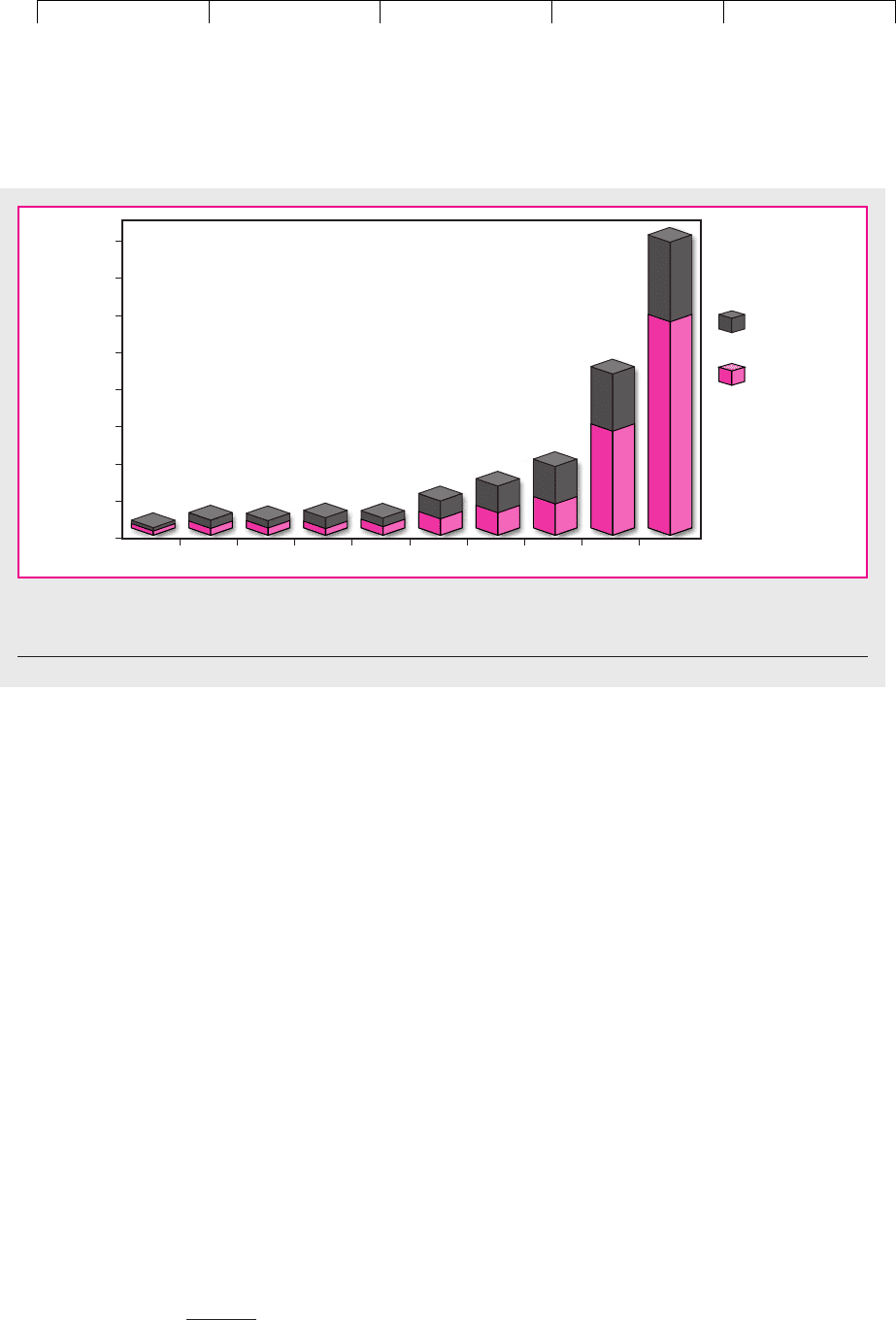Brealey, Myers. Principles of Corporate Finance. 7th edition
Подождите немного. Документ загружается.


Brealey−Meyers:
Principles of Corporate
Finance, Seventh Edition
IV. Financial Decisions and
Market Efficiency
15. How Corporations Issue
Securities
© The McGraw−Hill
Companies, 2003
CHAPTER FIFTEEN
400
HOW
CORPORATIONS
ISSUE SECURITIES

Brealey−Meyers:
Principles of Corporate
Finance, Seventh Edition
IV. Financial Decisions and
Market Efficiency
15. How Corporations Issue
Securities
© The McGraw−Hill
Companies, 2003
IN CHAPTER 11 we encountered Marvin Enterprises, one of the most remarkable growth companies
of the twenty-first century. It was founded by George and Mildred Marvin, two high-school dropouts,
together with their chum Charles P. (Chip) Norton. To get the company off the ground the three en-
trepreneurs relied on their own savings together with personal loans from a bank. However, the com-
pany’s rapid growth meant that they had soon borrowed to the hilt and needed more equity capital.
Equity investment in young private companies is generally known as venture capital. Such venture
capital may be provided by investment institutions or by wealthy individuals who are prepared to
back an untried company in return for a piece of the action. In the first part of this chapter we will ex-
plain how companies like Marvin go about raising venture capital.
Venture capital organizations aim to help growing firms over that awkward adolescent period be-
fore they are large enough to go public. For a successful firm such as Marvin, there is likely to come
a time when it needs to tap a wider source of capital and therefore decides to make its first public is-
sue of common stock. The next section of the chapter describes what is involved in such an issue. We
will explain the process for registering the offering with the Securities and Exchange Commission and
we will introduce you to the underwriters who buy the issue and resell it to the public. We will also
see that new issues are generally sold below the price at which they subsequently trade. To under-
stand why that is so, we will need to make a brief sortie into the field of auction procedures.
A company’s first issue of stock is seldom its last. In Chapter 14 we saw that corporations face a
persistent financial deficit which they meet by selling securities. We will therefore look at how es-
tablished corporations go about raising more capital. In the process we will encounter another puz-
zle: When companies announce a new issue of stock, the stock price generally falls. We suggest that
the explanation lies in the information that investors read into the announcement.
If a stock or bond is sold publicly, it can then be traded on the securities markets. But sometimes
investors intend to hold onto their securities and are not concerned about whether they can sell them.
In these cases there is little advantage to a public issue, and the firm may prefer to place the securi-
ties directly with one or two financial institutions. At the end of this chapter we will explain how com-
panies arrange a private placement.
401
15.1 VENTURE CAPITAL
On April 1, 2013, George and Mildred Marvin met with Chip Norton in their re-
search lab (which also doubled as a bicycle shed) to celebrate the incorporation of
Marvin Enterprises. The three entrepreneurs had raised $100,000 from savings and
personal bank loans and had purchased one million shares in the new company. At
this zero-stage investment, the company’s assets were $90,000 in the bank ($10,000
had been spent for legal and other expenses of setting up the company), plus the
idea for a new product, the household gargle blaster. George Marvin was the first
to see that the gargle blaster, up to that point an expensive curiosity, could be com-
mercially produced using microgenetic refenestrators.
Marvin Enterprises’ bank account steadily drained away as design and testing
proceeded. Local banks did not see Marvin’s idea as adequate collateral, so a trans-
fusion of equity capital was clearly needed. Preparation of a business plan was a
necessary first step. The plan was a confidential document describing the proposed
product, its potential market, the underlying technology, and the resources (time,
money, employees, plant, and equipment) needed for success.

Brealey−Meyers:
Principles of Corporate
Finance, Seventh Edition
IV. Financial Decisions and
Market Efficiency
15. How Corporations Issue
Securities
© The McGraw−Hill
Companies, 2003
Most entrepreneurs are able to spin a plausible yarn about their company. But it
is as hard to convince a venture capitalist that your business plan is sound as to get
a first novel published. Marvin’s managers were able to point to the fact that they
were prepared to put their money where their mouths were. Not only had they
staked all their savings in the company but they were mortgaged to the hilt. This
signaled their faith in the business.
1
First Meriam Venture Partners was impressed with Marvin’s presentation and
agreed to buy one million new shares for $1 each. After this first-stage financing, the
company’s market-value balance sheet looked like this:
402 PART IV
Financing Decisions and Market Efficiency
1
For a formal analysis of how management’s investment in the business can provide a reliable signal of
the company’s value, see H. E. Leland and D. H. Pyle, “Informational Asymmetries, Financial Struc-
ture, and Financial Intermediation,” Journal of Finance 32 (May 1977), pp. 371–387.
2
Venture capital investors do not necessarily demand a majority on the board of directors. Whether they
do depends, for example, on how mature the business is and on what fraction they own. A common
compromise gives an equal number of seats to the founders and to outside investors; the two parties
then agree to one or more additional directors to serve as tie-breakers in case a conflict arises. Regard-
less of whether they have a majority of directors, venture capital companies are seldom silent partners;
their judgment and contacts can often prove useful to a relatively inexperienced management team.
3
Notice the trade-off here. Marvin’s management is being asked to put all its eggs into one basket. That
creates pressure for managers to work hard, but it also means that they take on risk that could have been
diversified away.
Marvin Enterprises First-Stage Balance Sheet (Market Values in $ Millions)
Cash from new equity $1 $1 New equity from
venture capital
Other assets, 1 1 Original equity held
mostly intangible by entrepreneurs
Value $2 $2 Value
By accepting a $2 million after-the-money valuation, First Meriam implicitly put
a $1 million value on the entrepreneurs’ idea and their commitment to the enter-
prise. It also handed the entrepreneurs a $900,000 paper gain over their original
$100,000 investment. In exchange, the entrepreneurs gave up half their company
and accepted First Meriam’s representatives to the board of directors.
2
The success of a new business depends critically on the effort put in by the
managers. Therefore venture capital firms try to structure a deal so that man-
agement has a strong incentive to work hard. That takes us back to Chapters 1
and 12, where we showed how the shareholders of a firm (who are the principals)
need to provide incentives for the managers (who are their agents) to work to
maximize firm value.
If Marvin’s management had demanded watertight employment contracts
and fat salaries, they would not have found it easy to raise venture capital. In-
stead the Marvin team agreed to put up with modest salaries. They could cash in
only from appreciation of their stock. If Marvin failed they would get nothing,
because First Meriam actually bought preferred stock designed to convert auto-
matically into common stock when and if Marvin Enterprises succeeded in an
initial public offering or consistently generated more than a target level of earn-
ings. But if Marvin Enterprises had failed, First Meriam would have been first in
line to claim any salvageable assets. This raised even further the stakes for the
company’s management.
3

Brealey−Meyers:
Principles of Corporate
Finance, Seventh Edition
IV. Financial Decisions and
Market Efficiency
15. How Corporations Issue
Securities
© The McGraw−Hill
Companies, 2003
Venture capitalists rarely give a young company all the money it will need all
at once. At each stage they give enough to reach the next major checkpoint. Thus
in spring 2015, having designed and tested a prototype, Marvin Enterprises was
back asking for more money for pilot production and test marketing. Its second-
stage financing was $4 million, of which $1.5 million came from First Meriam, its
original backers, and $2.5 million came from two other venture capital partner-
ships and wealthy individual investors. The balance sheet just after the second
stage was as follows:
CHAPTER 15
How Corporations Issue Securities 403
Marvin Enterprises Second-Stage Balance Sheet (Market Values in $ Millions)
Cash from new equity $4 $4 New equity,
second stage
Fixed assets 1 5 Equity from first stage
Other assets, 9 5 Original equity held
mostly intangible by entrepreneurs
Value $14 $14 Value
Now the after-the-money valuation was $14 million. First Meriam marked up
its original investment to $5 million, and the founders noted an additional $4 mil-
lion paper gain.
Does this begin to sound like a (paper) money machine? It was so only with
hindsight. At stage 1 it wasn’t clear whether Marvin would ever get to stage 2; if
the prototype hadn’t worked, First Meriam could have refused to put up more
funds and effectively closed the business down.
4
Or it could have advanced stage
2 money in a smaller amount on less favorable terms. The board of directors could
also have fired George, Mildred, and Chip and gotten someone else to try to de-
velop the business.
In Chapter 14 we pointed out that stockholders and lenders differ in their cash-
flow rights and control rights. The stockholders are entitled to whatever cash flows
remain after paying off the other security holders. They also have control over how
the company uses its money, and it is only if the company defaults that the lenders
can step in and take control of the company. When a new business raises venture
capital, these cash-flow rights and control rights are usually negotiated separately.
The venture capital firm will want a say in how that business is run and will de-
mand representation on the board and a significant number of votes. The venture
capitalist may agree that it will relinquish some of these rights if the business sub-
sequently performs well. However, if performance turns out to be poor, the ven-
ture capitalist may automatically get a greater say in how the business is run and
whether the existing management should be replaced.
For Marvin, fortunately, everything went like clockwork. Third-stage mezzanine fi-
nancing was arranged,
5
full-scale production began on schedule, and gargle blasters
were acclaimed by music critics worldwide. Marvin Enterprises went public on Feb-
ruary 3, 2019. Once its shares were traded, the paper gains earned by First Meriam
4
If First Meriam had refused to invest at stage 2, it would have been an exceptionally hard sell con-
vincing another investor to step in its place. The other outside investors knew they had less informa-
tion about Marvin than First Meriam and would have read its refusal as a bad omen for Marvin’s
prospects.
5
Mezzanine financing does not necessarily come in the third stage; there may be four or five stages. The
point is that mezzanine investors come in late, in contrast to venture capitalists who get in on the
ground floor.

Brealey−Meyers:
Principles of Corporate
Finance, Seventh Edition
IV. Financial Decisions and
Market Efficiency
15. How Corporations Issue
Securities
© The McGraw−Hill
Companies, 2003
and the company’s founders turned into fungible wealth. Before we go on to this ini-
tial public offering, let us look briefly at the venture capital markets today.
The Venture Capital Market
Most new companies rely initially on family funds and bank loans. Some of them
continue to grow with the aid of equity investment provided by wealthy individ-
uals, known as angel investors. However, the bulk of the capital for adolescent com-
panies comes from specialist venture-capital firms, which pool funds from a vari-
ety of investors, seek out fledgling companies to invest in, and then work with
these companies as they try to grow. Figure 15.1 shows how the amount of venture
capital investment has increased. During the heady days of 2000 venture capital
funds invested nearly $140 billion in some 16,000 different companies.
Most venture capital funds are organized as limited private partnerships with
a fixed life of about 10 years. The management company is the general partner,
and the pension funds and other investors are limited partners. Some large in-
dustrial firms, such as Intel, General Electric, and Sun Microsystems also act as
corporate venturers by providing equity capital to new innovative companies.
6
Finally, in the United States the government provides cheap loans to small-
business investment companies (SBICs) that then relend the money to deserv-
ing entrepreneurs. SBICs occupy a small, specialized niche in the venture capi-
tal markets.
Venture capital firms are not passive investors. They provide ongoing advice to
the firms that they invest in and often play a major role in recruiting the senior
404 PART IV
Financing Decisions and Market Efficiency
0
10,000
20,000
30,000
40,000
50,000
60,000
70,000
80,000
1991 1992 1993 1994 1995 1996 1997 1998 1999 2000
$ Millions
Other
sources
Private
partnerships
FIGURE 15.1
U.S. venture capital disbursements by type of fund.
Source: Venture Economics/National Venture Capital Association.
6
See, for example, H. Chesbrough, “Designing Corporate Ventures in the Shadow of Private Venture
Capital,” California Management Review 42 (Spring 2000), pp. 31–49.

Brealey−Meyers:
Principles of Corporate
Finance, Seventh Edition
IV. Financial Decisions and
Market Efficiency
15. How Corporations Issue
Securities
© The McGraw−Hill
Companies, 2003
management team. This advice can be valuable to businesses in their early years
and helps them to bring their products more quickly to market.
7
Venture capitalists may cash in on their investment in two ways. Sometimes,
once the new business has established a track record, it may be sold out to a larger
firm. However, many entrepreneurs do not fit easily into a corporate bureaucracy
and would prefer instead to remain the boss. In this case, the company may decide,
like Marvin, to go public and so provide the original backers with an opportunity
to “cash out,” selling their stock and leaving the original entrepreneurs in control.
A thriving venture capital market therefore needs an active stock exchange, such
as Nasdaq, that specializes in trading the shares of young, rapidly growing firms.
8
In many countries, such as those of continental Europe, venture capital markets
have been slower to develop. But this is changing and investment in high-tech ven-
tures in Europe has begun to blossom. This has been helped by the formation of
new European exchanges that model themselves on Nasdaq. These mini-Nasdaqs
inlcude Aim in London, Neuer Markt in Frankfurt, and Nouveau Marché in Paris.
For every 10 first-stage venture capital investments, only two or three may survive
as successful, self-sufficient businesses, and rarely will they pay off as big as Marvin
Enterprises. From these statistics come two rules for success in venture capital invest-
ment. First, don’t shy away from uncertainty; accept a low probability of success. But
don’t buy into a business unless you can see the chance of a big, public company in a
profitable market. There’s no sense taking a long shot unless it pays off handsomely if
you win. Second, cut your losses; identify losers early, and if you can’t fix the prob-
lem—by replacing management, for example—throw no good money after bad.
How successful is venture capital investment? Since you can’t look up the value
of new start-up businesses in The Wall Street Journal, it is difficult to say with con-
fidence. However, Venture Economics, which tracks the performance of over 1,200
venture capital funds, calculated that from 1980 to 2000 investors in these funds
would have earned an average annual return of nearly 20 percent after expenses.
9
That is about 3 percent a year more than they would have earned from investing
in the stocks of large public corporations.
CHAPTER 15
How Corporations Issue Securities 405
7
For evidence on the role of venture capitalists in assisting new businesses, see T. Hellman and Manju Puri,
“The Interaction between Product Market and Financial Strategy: The Role of Venture Capital,” Review of
Financial Studies 13 (2000), pp. 959–984; and S. N. Kaplan and P. Stromberg, “How Do Venture Capitalists
Choose Investments,” working paper, Graduate School of Business, University of Chicago, August 2000.
8
This argument is developed in B. Black and R. Gilson, “Venture Capital and the Structure of Capital
Markets: Banks versus Stock Markets,” Journal of Financial Economics 47 (March 1998), pp. 243–277.
9
See www.ventureeconomics.com/news ve. Gompers and Lerner, who studied the period 1979–1997,
found somewhat higher returns (see P. A. Gompers and J. Lerner, “Risk and Reward in Private Equity
Investments: The Challenge of Performance Assessment,” Journal of Private Equity, Winter 1997,
pp. 5–12). In a study of a large sample of individual venture capital investments Cochrane tackles the
problem of measuring returns on investments that remain unmarketable. The average annually com-
pounded return on his sample is 57 percent, though the average continuously compounded return is much
lower (see J. Cochrane, “The Risk and Return of Venture Capital,” NBER Working Paper No. 8066, 2001).
15.2 THE INITIAL PUBLIC OFFERING
Very few new businesses make it big, but venture capitalists keep sane by forget-
ting about the many failures and reminding themselves of the success stories—the
investors who got in on the ground floor of firms like Federal Express, Genentech,
_

Brealey−Meyers:
Principles of Corporate
Finance, Seventh Edition
IV. Financial Decisions and
Market Efficiency
15. How Corporations Issue
Securities
© The McGraw−Hill
Companies, 2003
Compaq, Intel, and Sun Microsystems. When First Meriam invested in Marvin En-
terprises, it was not looking for cash dividends from its investment; instead it was
hoping for rapid growth that would allow Marvin to go public and give First
Meriam an opportunity to cash in on some of its gains.
By 2019 Marvin had grown to the point at which it needed still more capital to
implement its second-generation production technology. At this point it decided to
make an initial public offering of stock or IPO. This was to be partly a primary of-
fering; that is, new shares were to be sold to raise additional cash for the company.
It was also to be partly a secondary offering; that is, the venture capitalists and the
company’s founders were looking to sell some of their existing shares.
Often when companies go public, the issue is solely intended to raise new cap-
ital for the company. But there are also occasions when no new capital is raised and
all the shares on offer are being sold as a secondary offering by existing share-
holders. For example, in 1998 Du Pont sold off a large part of its holding in Conoco
for $4.4 billion.
10
Some of the biggest IPOs occur when governments sell off their shareholdings
in companies. For example, the British government raised $9 billion from its sale
of British Gas stock, while the secondary offering of Nippon Telegraph and Tele-
phone by the Japanese government brought in nearly $13 billion.
For Marvin there were other benefits from going public. The market value of
its stock would provide a readily available measure of the company’s perfor-
mance and would allow Marvin to reward its management team with stock op-
tions. Because information about the company would become more widely avail-
able, Marvin could diversify its sources of finance and reduce its costs of
borrowing. These benefits outweighed the expense of the public issue and the
continuing costs of administering a public company and communicating with its
shareholders.
Instead of going public, many successful entrepreneurs may decide to sell out
to a larger firm or they may continue to operate successfully as private, unlisted
companies. Some very large companies in the United States are private. They in-
clude Bechtel, Cargill, and Levi Strauss. In other countries it is more common for
large companies to remain privately owned. For example, since 1988 there have
been only 70 listings of new, independent, nonfinancial companies on the Milan
Stock Exchange.
11
Arranging an Initial Public Offering
12
Once Marvin had made the decision to go public, its first task was to select the un-
derwriters. Underwriters act as financial midwives to a new issue. Usually they
play a triple role: First they provide the company with procedural and financial ad-
vice, then they buy the issue, and finally they resell it to the public.
After some discussion Marvin settled on Klein Merrick as the managing under-
writer and Goldman Stanley as the co-manager. Klein Merrick then formed a syn-
dicate of underwriters who would buy the entire issue and reoffer it to the public.
406 PART IV
Financing Decisions and Market Efficiency
10
This is the largest U.S. IPO, but it is dwarfed by the Japanese telecom company NTT DoCoMo, which
sold $18 billion of stock in 1998 and handed out $500 million in fees to the underwriters.
11
The reasons for going public in Italy are analyzed in M. Pagano, F. Panetta, and L. Zingales, “Why Do
Companies Go Public? An Empirical Analysis,” Journal of Finance 53 (February 1998), pp. 27–64.
12
For an excellent case study of how one company went public, see B. Uttal, “Inside the Deal That Made
Bill Gates $350,000,000,” Fortune, July 21, 1986.

Brealey−Meyers:
Principles of Corporate
Finance, Seventh Edition
IV. Financial Decisions and
Market Efficiency
15. How Corporations Issue
Securities
© The McGraw−Hill
Companies, 2003
Together with Klein Merrick and firms of lawyers and accountants, Marvin pre-
pared a registration statement for the approval of the Securities and Exchange
Commission (SEC).
13
This statement is a detailed and somewhat cumbersome doc-
ument that presents information about the proposed financing and the firm’s his-
tory, existing business, and plans for the future.
The most important sections of the registration statement are distributed to in-
vestors in the form of a prospectus. In Appendix B to this chapter we have repro-
duced the prospectus for Marvin’s first public issue of stock.
14
Real prospectuses
would go into much more detail on each topic, but this example should give you
some feel for the mixture of valuable information and redundant qualification that
characterizes these documents. The Marvin prospectus also illustrates how the
SEC insists that investors’ eyes are opened to the dangers of purchase (see “Certain
Considerations” of the prospectus). Some investors have joked that if they read
each prospectus carefully, they would not dare buy any new issue.
In addition to registering the issue with the SEC, Marvin needed to check that
the issue complied with the so-called blue-sky laws of each state that regulate sales
of securities within the state.
15
It also arranged for its newly issued shares to be
traded on the Nasdaq exchange.
The Sale of Marvin Stock
While the registration statement was awaiting approval, Marvin and its under-
writers began to firm up the issue price. First they looked at the price–earnings ra-
tios of the shares of Marvin’s principal competitors. Then they worked through a
number of discounted-cash-flow calculations like the ones we described in Chap-
ters 4 and 11. Most of the evidence pointed to a market value of $75 a share.
Marvin and Klein Merrick arranged a road show to talk to potential investors.
Mostly these were institutional investors, such as managers of mutual funds
and pension funds. The investors gave their reactions to the issue and indicated
to the underwriters how much stock they wished to buy. Some stated the maxi-
mum price that they were prepared to pay, but others said that they just wanted
to invest so many dollars in Marvin at whatever issue price was chosen. These
discussions with fund managers allowed Klein Merrick to build up a book of po-
tential orders.
16
Although the managers were not bound by their responses, they
knew that, if they wanted to keep in the underwriters’ good books, they should
be careful not to go back on their expressions of interest. The underwriters also
were not bound to treat all investors equally. Some investors who were keen to
CHAPTER 15
How Corporations Issue Securities 407
13
The rules governing the sale of securities derive principally from the Securities Act of 1933. The SEC
is concerned solely with disclosure and it has no power to prevent an issue as long as there has been
proper disclosure. Some public issues are exempt from registration. These include issues by small busi-
nesses and loans maturing within nine months.
14
The company is allowed to circulate a preliminary version of the prospectus (known as a red herring)
before the SEC has approved the registration statement.
15
In 1980, when Apple Computer Inc. went public, the Massachusetts state government decided the of-
fering was too risky and barred the sale of the shares to individual investors in the state. The state re-
lented later after the issue was out and the price had risen. Needless to say, this action was not acclaimed
by Massachusetts investors.
States do not usually reject security issues by honest firms through established underwriters. We cite
the example to illustrate the potential power of state securities laws and to show why underwriters
keep careful track of them.
16
The managing underwriter is therefore often known as the bookrunner.

Brealey−Meyers:
Principles of Corporate
Finance, Seventh Edition
IV. Financial Decisions and
Market Efficiency
15. How Corporations Issue
Securities
© The McGraw−Hill
Companies, 2003
buy Marvin stock were disappointed in the allotment that they subsequently
received.
Immediately after it received clearance from the SEC, Marvin and the under-
writers met to fix the issue price. Investors had been enthusiastic about the story
that the company had to tell and it was clear that they were prepared to pay more
than $75 for the stock. Marvin’s managers were tempted to go for the highest pos-
sible price, but the underwriters were more cautious. Not only would they be left
with any unsold stock if they overestimated investor demand but they also argued
that some degree of underpricing was needed to tempt investors to buy the stock.
Marvin and the underwriters therefore compromised on an issue price of $80.
Although Marvin’s underwriters were committed to buy only 900,000 shares
from the company, they chose to sell 1,035,000 shares to investors. This left the un-
derwriters short of 135,000 shares or 15 percent of the issue. If Marvin’s stock had
proved unpopular with investors and traded below the issue price, the underwrit-
ers could have bought back these shares in the marketplace. This would have
helped to stabilize the price and would have given the underwriters a profit on
these extra shares that they sold. As it turned out, investors fell over themselves to
buy Marvin stock and by the end of the first day the stock was trading at $105. The
underwriters would have incurred a heavy loss if they had been obliged to buy
back the shares at $105. However, Marvin had provided underwriters with a green-
shoe option which allowed them to buy an additional 135,000 shares from the com-
pany. This ensured that the underwriters were able to sell the extra shares to in-
vestors without fear of loss.
In choosing Klein Merrick to manage its IPO, Marvin was influenced by Mer-
rick’s proposals for making an active market in the stock in the weeks after the is-
sue.
17
Merrick also planned to generate continuing investor interest in the stock by
distributing a major research report on Marvin’s prospects.
18
The Underwriters
Companies get to make only one IPO, but underwriters are in the business all the
time. Established underwriters are, therefore, careful of their reputation and will
not handle a new issue unless they believe the facts have been presented fairly to
investors. Thus, in addition to handling the sale of Marvin’s issue, the under-
writers in effect gave their seal of approval to it. This implied endorsement was
worth quite a bit to a company like Marvin that was coming to the market for the
first time.
Marvin’s underwriters were prepared to enter into a firm commitment to buy
the stock and then offer it to the public. Thus they took the risk that the issue
might flop and they would be left with unwanted stock. Occasionally, where the
sale of common stock is regarded as particularly risky, the underwriters may be
408 PART IV
Financing Decisions and Market Efficiency
17
On average the managing underwriter accounts for 40 to 60 percent of trading volume in the stock
during the first 60 days after an IPO. See K. Ellis, R. Michaely, and M. O’Hara, “When the Underwriter
is the Market Maker: An Examination of Trading in the IPO Aftermarket,” Journal of Finance 55 (June
2000), pp. 1039–1074.
18
The 25 days after the offer is designated as a quiet period. Merrick is obliged to wait until after this pe-
riod before commenting on the valuation of the company. Survey evidence suggests that, in choosing
an underwriter, firms place considerable importance on its ability to provide follow-up research re-
ports. See L. Krigman, W. H. Shaw, and K. L. Womack, “Why Do Firms Switch Underwriters?” Journal
of Financial Economics 60 (May–June 2001), pp. 245–284.

Brealey−Meyers:
Principles of Corporate
Finance, Seventh Edition
IV. Financial Decisions and
Market Efficiency
15. How Corporations Issue
Securities
© The McGraw−Hill
Companies, 2003
prepared to handle the sale only on a best-efforts basis. In this case the under-
writers promise to sell as much of the issue as possible but do not guarantee to
sell the entire amount.
19
Successful underwriting requires financial muscle, considerable experience,
and an established reputation. The names of Marvin’s underwriters are of course
fictitious, but Table 15.1 shows that underwriting in the United States is dominated
by the major investment banks and large commercial banks. Foreign players are
also heavily involved in underwriting securities that are sold internationally.
Underwriting is not always fun. On October 15, 1987, the British government fi-
nalized arrangements to sell its holding of BP shares at £3.30 a share.
20
This huge
issue involved more than $12 billion and was underwritten by an international
group of underwriters who marketed it in a number of countries. Four days after
the underwriting was agreed, the October crash caused stock prices around the
world to nose-dive. The underwriters unsuccessfully appealed to the British gov-
ernment to cancel the issue.
21
By the closing date of the offer, the price of BP stock
had fallen to £2.96, and the underwriters had lost more than a billion dollars.
Underwriters face another danger. When a new issue goes wrong and the stock
performs badly, they may be blamed for overhyping the issue. For example, in De-
cember 1999 the software company Va Linux went public at $30 a share. Next-day
trading opened at $299 a share, but then the stock price began to sag. As we write
this in November 2001, the stock is selling for less than $2. Disgruntled Va Linux
investors sued the underwriters, complaining that the prospectus was “materially
false.” These underwriters had plenty of company; following the collapse of the
“new economy” stocks in 2000, investors in almost one in three recent high-tech
IPOs sued the underwriters.
CHAPTER 15
How Corporations Issue Securities 409
19
The alternative is to enter into an all-or-none arrangement. In this case, either the entire issue is sold at
the offering price or the deal is called off and the issuing company receives nothing.
20
The issue was partly a secondary issue (the sale of the British government’s shares) and partly a pri-
mary issue (BP took the opportunity to raise additional capital by selling new shares).
21
The government’s only concession was to put a floor on the underwriters’ losses by giving them the
opportunity to resell their stock to the government at £2.80 a share.
Underwriter Value of Issues Number of Issues
Merrill Lynch $353 1,566
Citigroup/Salomon
Smith Barney 334 1,039
Credit Suisse First Boston 252 996
JP Morgan 232 818
Morgan Stanley
Dean Witter 211 656
Lehman Brothers 193 660
Goldman Sachs 189 598
UBS Warburg 172 690
Deutsche Bank 166 573
Banc of America Securities 125 571
TABLE 15.1
The top managing underwriters
January 2001 to September 2001.
Values include global debt and
equity issues. Figures in billions.
Source: Thomson Financial Investment
Banking/Capital Markets
(www.tfibcm.com
).
